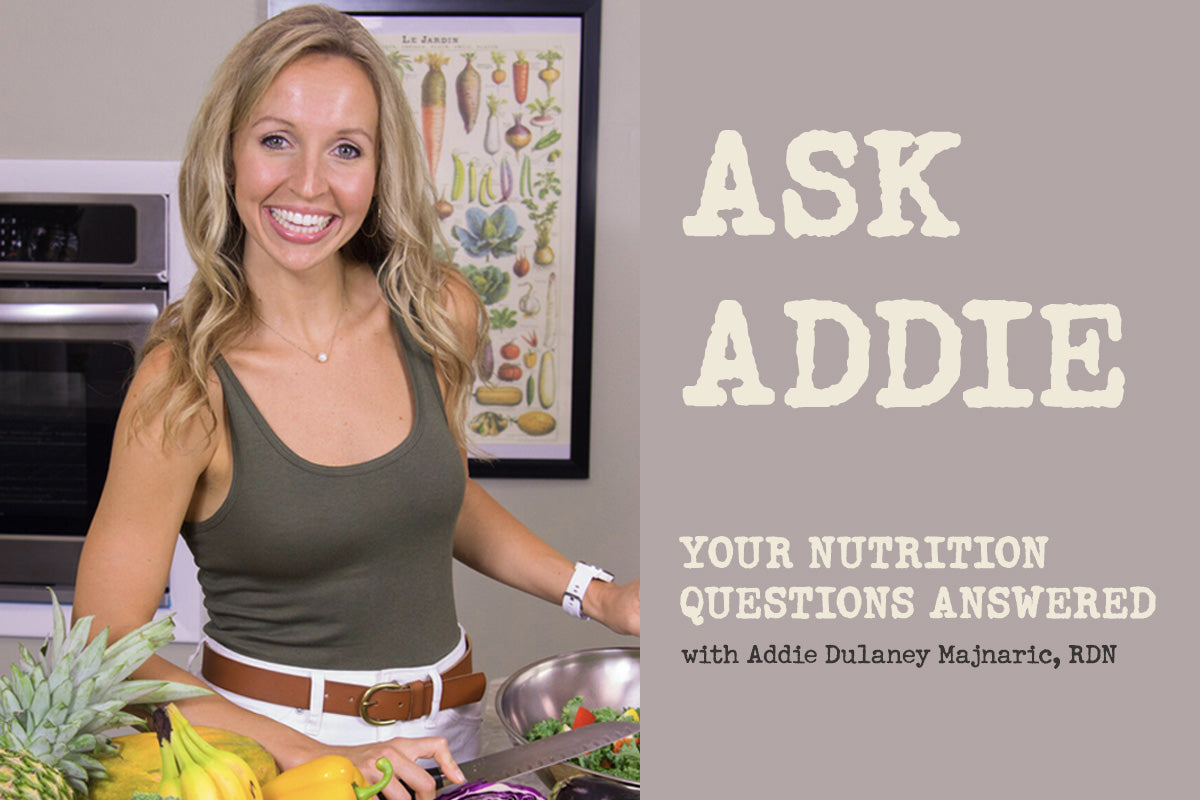
Your nutrition questions answered
Addie Dulaney Majnaric is a Registered Dietitian Nutritionist and Licensed Dietitian.
Each week Addie answers your nutrition questions.
How do I know if I'm getting enough protein?
Why am I so gassy?
Why am I pooping so much?
Q: How do I know if I'm getting enough protein?
A: I get asked this often. The truth is, I have yet to see protein deficiency in anyone meeting their caloric requirements. A lot of people are actually exceeding their daily protein needs on a regular basis.
Most adults don’t need a high daily protein intake. The rule of thumb is 0.8 g/kg of your healthy, ideal body weight. Some studies show that even 0.8 g/kg may be too high, and that about 0.66 g/kg of your healthy, ideal body weight may be plenty of protein per day.
What does that look like? If your healthy body weight is 130 pounds (59.1 kg), you would need anywhere from 39 to 47 grams of protein per day. (Elite athletes, pregnant women, and those recovering from severe injury or surgery do need more.)
But you don’t need to open a nutrition tracker app at every meal to measure your protein. If you consume enough calories to maintain your healthy body weight, and you eat balanced, whole food plant-based meals, you are more than likely fine.
I recommend about 1 to 1.5 cups of beans a day to set the baseline for your protein, as well as your iron, B vitamin, calcium, and fiber intake.
Whole grains, potatoes, nuts, seeds, lentils, and other legumes also have high amounts of protein. A lot of fruits and vegetables contribute to our daily protein intake, too. Here’s a quick rundown on just some of the many protein-rich plants.
1 cup of black beans = 14.2 g protein
1 cup of chick peas = 11.6 g protein
½ cup tofu = 10 g protein
½ cup oatmeal = 6 g protein
1 baked potato = 5 g protein
1 cup of broccoli = 2 g protein
1 Tbsp of chia seeds = 3 g protein
1 cup of blackberries = 1.4 g protein
What about eating more protein for muscular gain?
There really is no use. Your body can process only so much protein in a day, and the rest is excreted through your urine as nitrogen waste. In fact, consuming too much protein on a regular basis can damage your kidneys and increase inflammation in the body.
Stick to eating colorful meals, balanced with fruits, vegetables, whole grains, and beans, and you are well on your way to meeting all of your nutritional needs!
Q: Why am I so gassy?
A: If you’re new to the plant-based life, chances are your energy has improved, maybe you’ve lost a little weight, your skin is glowing… life is good. Except for the gas!
Do not fear. This is completely normal, and it will settle down.
You have more gas because your intestines are waking up. Low fiber processed foods more or less put your intestines to sleep. As you eat more fiber-rich plants, healthy gut bacteria transitions to help you digest. New enzymes are activated, and the good gut bacteria in your colon creates gas as a by-product of this more alert digestion.
It takes time for your gut to adjust to change, but you can definitely help it along. Drink plenty of water. Eat consistent amounts of food at consistent times. Try cooked vegetables for some meals instead of all raw. Start with a smaller amount of beans at each meal.
Give it a few weeks, and soon your gut will actually function more optimally than ever before! Your digestive system LOVES fiber. it just needs time to get used to breaking down this new food profile.
Q: Why am I pooping so much?
A: The short answer? You’re finally eating more fiber.
Our intestines love fiber. They function best when we eat 40 to 50 grams of fiber a day. But because Americans tend to eat high protein diets, heavy in animal products and dairy, most of us get only about 10 to 15 grams of fiber per day.
This means that many of us experience constipation or slowed bowel movements because we lack fiber. When you start eating a whole food plant-based diet, you finally get enough fiber to do one of its big jobs — forming poop! And cleaning out the buildup of decaying, processed, animal-product food that’s been sitting in your gut for a while!
However, that’s not all fiber does. Not at all. Fiber is truly one of the most important nutrients. It’s what we should focus on far more than protein, our society’s favorite nutrient obsession.
Fiber helps us in three main ways. First, it helps slow gastric emptying. This is the release of food from our stomach into our small intestine where the majority of nutrient absorption occurs. The slow-down makes our rate of nutrient absorption much more efficient.
Second, because fiber helps us absorb nutrients more efficiently, our blood glucose can stabilize. We don’t experience high energy spikes and big lows later on in the day.
Third, once the digestive process reaches the large intestine, fiber helps in the formation of stool.
Over a couple of weeks, your bowel movements will normalize. On average you’ll poop about 2-3 times per day. As a plant eater, you’ll typically have much more “regular” bowel movements and find it easier to go than people eating the Standard American Diet. Your colon will be much healthier, decreasing your risk of colon cancer. All because of the power of fiber!
Nutrition questions?
Send your questions to Addie at info@mamasezz.com
